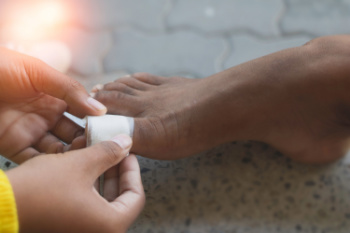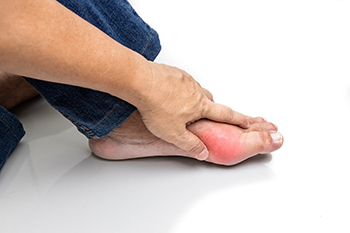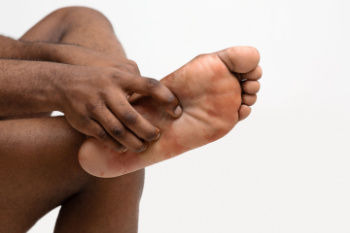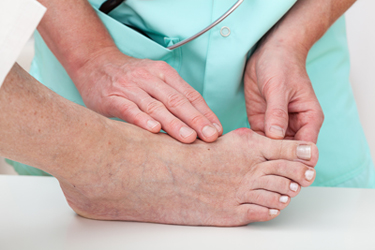Connect With Us
Blog
Items filtered by date: October 2024
Managing Diabetic Foot Blisters

Diabetic foot blisters, or diabetic bullae, are fluid-filled pockets that can develop on the skin of the feet. Diabetic blisters, which resemble those caused by burns but without the accompanying pain, are often harmless but can become problematic if they become infected. People with diabetes, particularly those who have peripheral neuropathy or poor circulation, may not feel the blister form and may overlook it. Common causes include wearing poorly fitting shoes that create friction on the feet, as well as high blood sugar levels that compromise skin integrity. A podiatrist can assess the severity of diabetic blisters and help prevent complications, such as infections that can arise if they are not properly managed. Regular monitoring of foot health, wearing well-fitted shoes, and managing blood sugar levels are important steps in preventing foot blisters. If you have foot blisters related to diabetes, it is suggested that you schedule an appointment with a podiatrist for treatment of blisters and other foot complications.
Blisters are prone to making everyday activities extremely uncomfortable. If your feet are hurting, contact one of our podiatrists of Lakeside Foot and Ankle Center. Our practitioners can provide the care you need to keep you pain-free and on your feet.
Foot Blisters
Foot blisters develop as a result of constantly wearing tight or ill-fitting footwear. This happens due to the constant rubbing from the shoe, which can often lead to pain.
What Are Foot Blisters?
A foot blister is a small fluid-filled pocket that forms on the upper-most layer of the skin. Blisters are filled with clear fluid and can lead to blood drainage or pus if the area becomes infected.
How Do Blisters Form?
Blisters on the feet are often the result of constant friction of skin and material, usually by shoe rubbing. Walking in sandals, boots, or shoes that don’t fit properly for long periods of time can result in a blister. Having consistent foot moisture and humidity can easily lead to blister formation.
Prevention & Treatment
It is important to properly care for the affected area in order to prevent infection and ease the pain. Do not lance the blister and use a Band-Aid to provide pain relief. Also, be sure to keep your feet dry and wear proper fitting shoes. If you see blood or pus in a blister, seek assistance from a podiatrist.
If you have any questions, please feel free to contact our offices located in Leesburg and The Villages, FL . We offer the newest diagnostic and treatment technologies for all your foot care needs.
Causes and Risk Factors for Gout

Gout is caused by an excess buildup of uric acid in the body, leading to the formation of sharp, needle-like crystals in the joints. Gout often affects the joint at the base of the big toe, resulting in sudden and severe pain, swelling, and redness. The affected area may feel warm, tender, and inflamed, making it difficult to put weight on the foot. These intense symptoms typically occur at night and can disrupt sleep. After the initial flare-up of gout, the extreme pain may subside, but discomfort and joint stiffness may persist for several days. Gout also may impact range of motion in the affected joint. Risk factors include a diet high in purine-rich foods, such as red meat and seafood, as well as excessive alcohol consumption and certain medications that raise uric acid levels. Other contributing factors include kidney disease, high blood pressure, and obesity. If you have symptoms of gout, it is suggested that you schedule an appointment with a podiatrist for a diagnosis and treatment options.
Gout is a painful condition that can be treated. If you are seeking treatment, contact one of our podiatrists from Lakeside Foot and Ankle Center. Our practitioners will treat your foot and ankle needs.
What Is Gout?
Gout is a form of arthritis that is characterized by sudden, severe attacks of pain, redness, and tenderness in the joints. The condition usually affects the joint at the base of the big toe. A gout attack can occur at any random time, such as the middle of the night while you are asleep.
Symptoms
- Intense Joint Pain - Usually around the large joint of your big toe, and it most severe within the first four to twelve hours
- Lingering Discomfort - Joint discomfort may last from a few days to a few weeks
- Inflammation and Redness -Affected joints may become swollen, tender, warm and red
- Limited Range of Motion - May experience a decrease in joint mobility
Risk Factors
- Genetics - If family members have gout, you’re more likely to have it
- Medications - Diuretic medications can raise uric acid levels
- Gender/Age - Gout is more common in men until the age of 60. It is believed that estrogen protects women until that point
- Diet - Eating red meat and shellfish increases your risk
- Alcohol - Having more than two alcoholic drinks per day increases your risk
- Obesity - Obese people are at a higher risk for gout
Prior to visiting your podiatrist to receive treatment for gout, there are a few things you should do beforehand. If you have gout you should write down your symptoms--including when they started and how often you experience them, important medical information you may have, and any questions you may have. Writing down these three things will help your podiatrist in assessing your specific situation so that he or she may provide the best route of treatment for you.
If you have any questions, please feel free to contact our offices located in Leesburg and The Villages, FL . We offer the newest diagnostic and treatment technologies for all your foot care needs.
Reasons You May Need Foot Surgery

Reconstructive foot surgery is performed to restore the anatomy and function of the foot when other treatment options are ineffective. It is typically recommended for severe foot conditions caused by trauma, birth defects, infections, or chronic diseases like diabetes. Common reasons for considering reconstructive foot surgery include major injuries, vascular diseases, and congenital deformities such as clubfoot. Surgical reconstruction may involve tendon transfers, tissue grafts, and in some cases, bone realignment. The goal is to improve foot function, reduce pain, and improve mobility. Recovery depends on the extent of the surgery and may take several months. A podiatrist can evaluate the best surgical options, guide your post-operative care, and help restore foot function through rehabilitation techniques. If you believe you may benefit from reconstructive foot surgery, it is suggested that you schedule an appointment with a podiatrist.
Foot surgery is sometimes necessary to treat a foot ailment. To learn more, contact one of our podiatrists of Lakeside Foot and Ankle Center. Our practitioners will assist you with all of your foot and ankle needs.
When Is Surgery Necessary?
Foot and ankle surgery is generally reserved for cases in which less invasive, conservative procedures have failed to alleviate the problem. Some of the cases in which surgery may be necessary include:
- Removing foot deformities like bunions and bone spurs
- Severe arthritis that has caused bone issues
- Cosmetic reconstruction
What Types of Surgery Are There?
The type of surgery you receive will depend on the nature of the problem you have. Some of the possible surgeries include:
- Bunionectomy for painful bunions
- Surgical fusion for realignment of bones
- Neuropathy decompression surgery to treat nerve damage
Benefits of Surgery
Although surgery is usually a last resort, it can provide more complete pain relief compared to non-surgical methods and may allow you to finally resume full activity.
Surgical techniques have also become increasingly sophisticated. Techniques like endoscopic surgery allow for smaller incisions and faster recovery times.
If you have any questions please feel free to contact our offices located in Leesburg and The Villages, FL . We offer the newest diagnostic and treatment technologies for all your foot and ankle needs.
We Can Treat Your Foot or Ankle Pain
Symptoms and Risk Factors of Plantar Fasciitis

Plantar fasciitis is caused by inflammation of the plantar fascia, a ligament that runs from the heel to the ball of the foot, supporting the arch. The main symptoms of plantar fasciitis is sharp pain in the heel or arch that is often more severe in the morning or after prolonged standing. Heel pain may improve slightly after walking but often returns with continued activity. Risk factors for plantar fasciitis include flat feet, high arches, obesity, and repetitive activities like running. Tight calf muscles can also increase the likelihood of developing this condition. A podiatrist can evaluate your symptoms and recommend treatment options. Included are stretching exercises, footwear adjustments, and custom orthotics. Surgery may be suggested in more severe cases. If you have heel pain caused by plantar fasciitis, it is suggested that you schedule an appointment with a podiatrist for an exam and treatment.
Plantar fasciitis is a common foot condition that is often caused by a strain injury. If you are experiencing heel pain or symptoms of plantar fasciitis, contact one of our podiatrists from Lakeside Foot and Ankle Center. Our practitioners can provide the care you need to keep you pain-free and on your feet.
What Is Plantar Fasciitis?
Plantar fasciitis is one of the most common causes of heel pain. The plantar fascia is a ligament that connects your heel to the front of your foot. When this ligament becomes inflamed, plantar fasciitis is the result. If you have plantar fasciitis you will have a stabbing pain that usually occurs with your first steps in the morning. As the day progresses and you walk around more, this pain will start to disappear, but it will return after long periods of standing or sitting.
What Causes Plantar Fasciitis?
- Excessive running
- Having high arches in your feet
- Other foot issues such as flat feet
- Pregnancy (due to the sudden weight gain)
- Being on your feet very often
There are some risk factors that may make you more likely to develop plantar fasciitis compared to others. The condition most commonly affects adults between the ages of 40 and 60. It also tends to affect people who are obese because the extra pounds result in extra stress being placed on the plantar fascia.
Prevention
- Take good care of your feet – Wear shoes that have good arch support and heel cushioning.
- Maintain a healthy weight
- If you are a runner, alternate running with other sports that won’t cause heel pain
There are a variety of treatment options available for plantar fasciitis along with the pain that accompanies it. Additionally, physical therapy is a very important component in the treatment process. It is important that you meet with your podiatrist to determine which treatment option is best for you.
If you have any questions, please feel free to contact our offices located in Leesburg and The Villages, FL . We offer the newest diagnostic and treatment technologies for all your foot care needs.
Non-Surgical Treatment for Bunions

Bunions, a bony bump at the base of your big toe, can result from a misalignment of bones and tissues that pushes the toe inward. While surgery is the only way to completely remove a bunion, nonsurgical bunion treatments can effectively manage symptoms and slow progression. Wearing shoes with a wide toe box and low heels can reduce pressure on the bunion. Custom orthotics can help with proper foot alignment. Toe spacers and splints can also relieve discomfort by preventing further misalignment, although they will not permanently correct the bone structure. Stretching exercises may increase flexibility and ease pain, but they will not reverse the bunion itself. If your bunion is causing discomfort, consulting a podiatrist early can lead to treatment options that delay or prevent further complications. If you have pain caused by a bunion, it is suggested that you schedule an appointment with a podiatrist for guidance.
If you are suffering from bunions, contact one of our podiatrists of Lakeside Foot and Ankle Center. Our practitioners can provide the care you need to keep you pain-free and on your feet.
What Is a Bunion?
A bunion is formed of swollen tissue or an enlargement of boney growth, usually located at the base joint of the toe that connects to the foot. The swelling occurs due to the bones in the big toe shifting inward, which impacts the other toes of the foot. This causes the area around the base of the big toe to become inflamed and painful.
Why Do Bunions Form?
Genetics – Susceptibility to bunions are often hereditary
Stress on the feet – Poorly fitted and uncomfortable footwear that places stress on feet, such as heels, can worsen existing bunions
How Are Bunions Diagnosed?
Doctors often perform two tests – blood tests and x-rays – when trying to diagnose bunions, especially in the early stages of development. Blood tests help determine if the foot pain is being caused by something else, such as arthritis, while x-rays provide a clear picture of your bone structure to your doctor.
How Are Bunions Treated?
- Refrain from wearing heels or similar shoes that cause discomfort
- Select wider shoes that can provide more comfort and reduce pain
- Anti-inflammatory and pain management drugs
- Orthotics or foot inserts
- Surgery
If you have any questions, please feel free to contact our offices located in Leesburg and The Villages, FL . We offer the newest diagnostic and treatment technologies for all your foot care needs.
Blog Archives
- March 2025
- February 2025
- January 2025
- December 2024
- November 2024
- October 2024
- September 2024
- August 2024
- July 2024
- June 2024
- May 2024
- April 2024
- March 2024
- February 2024
- January 2024
- December 2023
- November 2023
- October 2023
- September 2023
- August 2023
- July 2023
- June 2023
- May 2023
- April 2023
- March 2023
- February 2023
- January 2023
- December 2022
- November 2022
- October 2022

